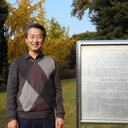Isolation and characterization of an anti-HSV polysaccharide from Prunella vulgaris.
Mots clés
Abstrait
A water soluble substance was isolated from a Chinese herb, Prunella vulgaris, by hot water extraction, ethanol precipitation and gel permeation column chromatography. Chemical tests showed that the substance was an anionic polysaccharide. Using a plaque reduction assay, the polysaccharide at 100 microg/ml was active against the herpes simplex virus types 1 and 2 (HSV-1 and HSV-2), but was inactive against cytomegalovirus, the human influenza virus types A and B, the poliovirus type 1 or the vesicular stomatitis virus. The 50% plaque reduction dose of the polysaccharide for HSV-1 and HSV-2 was 10 microg/ml. Clinical isolates and known acyclovir-resistant (TK-deficient or polymerase-defective) strains of HSV-1 and HSV-2 were similarly inhibited by the polysaccharide. Pre-incubation of HSV-1 with the polysaccharide at 4, 25 or 37 degrees C completely abrogated the infectivity of HSV-1, but pre-treatment of Vero cells with the polysaccharide did not protect cells from infection by the virus. The addition of the polysaccharide at 0, 2, 5.5 and 8 h post-infection of Vero cells with HSV-1 at a multiplicity of infection (MOI) of five reduced the 20 h-yield of intracellular infectious virus by 100, 99, 99 and 94%, respectively. In contrast, a similar addition of heparin showed 85, 63, 53 and 3% reduction of intracellular virus yield, respectively. These results suggest that the polysaccharide may inhibit HSV by competing for cell receptors as well as by some unknown mechanisms after the virus has penetrated the cells. The Prunella polysaccharide was not cytotoxic to mammalian cells up to the highest concentration tested, 0.5 mg/ml and did not show any anti-coagulant activity. In conclusion, the polysaccharide isolated from P. vulgaris has specific activity against HSV and its mode of action appears to be different from other anionic carbohydrates, such as heparin.


